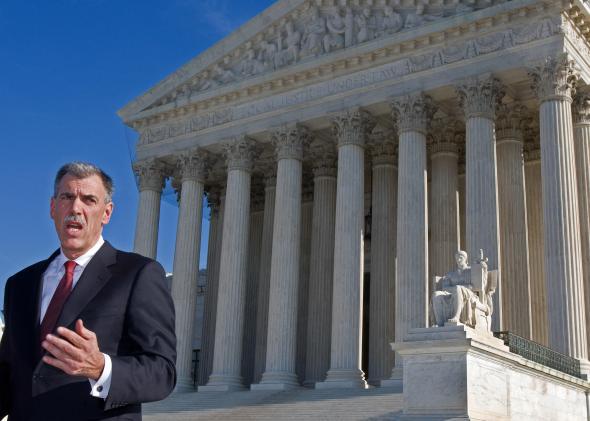In the months leading up to Tuesday’s marriage equality arguments before the Supreme Court, gay rights groups tied themselves in knots over which attorney should represent the cause in front of the justices. The agonizing turned out to be for naught. Although Mary Bonauto, the anointed advocate for equality, held her own on Tuesday, she failed to point the justices toward a single, unifying argument that would tie together complex legal doctrines and simple human compassion. By the time she sat down, the case for marriage equality had been muddled by conservative justices’ endless questions about the ancient roots of opposite-sex marriage.
Then two things happened. First, a protestor arose and shouted “Homosexuality is an abomination!” and “You’ll all burn in hell!” Then, seconds after he was escorted from the courtroom, Solicitor General Donald Verrilli approached the bench. As the protestor was dragged down the hall, Verrilli began to defend same-sex marriage on behalf of the United States. Shouts of “abomination” and “hell” echoed into the courtroom as Verrilli began to speak. But he forged ahead anyway—and what he said over the next fifteen minutes masterfully established the burning importance and obvious correctness of marriage equality.
Verrilli is a calm, careful advocate, and his tepid arguments in support of same-sex marriage two years ago were unenthused and unpersuasive. This time around, Verrilli simply nailed it. With his fifteen minutes, Verrilli grounded marriage equality in “human dignity,” explaining that, if the court rules the wrong way, “thousands and thousands of people are going to live out their lives and go to their deaths without their states ever recognizing the equal dignity of their relationships.” Justice Anthony Kennedy is absolutely fixated on dignity, and Verrilli’s argument is clearly designed to bait him.
It works. Kennedy responds positively, asking Verrilli, “haven’t we learned a tremendous amount [about gay people] since Lawrence, just in the last 10 years?”
“Yes,” Verrilli responds, not missing a beat. (Kennedy, of course, wrote the majority opinion in Lawrence, striking down sodomy bans.) Verrilli then holds Kennedy’s hand and walks him down the path upon which Bonauto stumbled:
I do think Lawrence was an important catalyst that has brought us to where we are today. And I think what Lawrence did was provide an assurance that gay and lesbian couples could live openly in a society as free people and start families and raise families and participate fully in their communities without fear. … We understand now, in a way even that we did not fully understand in Lawrence, that gay and lesbian people and gay and lesbian couples are full and equal members of the community. And what we once thought of as necessary and proper reasons for ostracizing and marginalizing gay people, we now understand do not justify that kind of impression.
You can almost hear Kennedy smile and think, now we’re talking. It’s this stuff that Kennedy wants to hear: stuff about free people and communities and equality, about all the lives he’ll make better if he rules the right way. Verrilli lays it on thick, later telling Kennedy that “there’s a profound connection between [constitutional] liberty and equality”—a connection Kennedy has harped upon in his gay rights opinions. Verrilli talks about families and children and, above all, dignity. As his time ends, he delivers the perfect peroration: “Gay and lesbian people are equal. They deserve equal protection of the laws, and they deserve it now.”
Verrilli’s appeal to Kennedy’s favorite concepts may be, as Jeffrey Toobin wrote, blatant pandering. But if so, it is pandering that works. Everybody knows Kennedy holds the key to the outcome of this case. Verrilli’s brief, brilliant turn at the lectern pivoted arguments in the right direction and gave Kennedy all the ammunition he needs to blast down state-level marriage bans. If and when that happens, we’ll have a long roster of advocates to thank. Verrilli should be at the top of the list.
Read more of Slate’s coverage of gay marriage at the Supreme Court.
